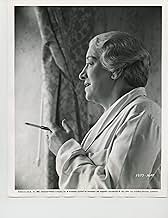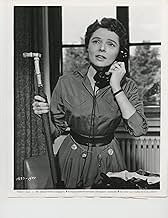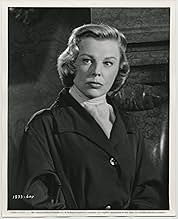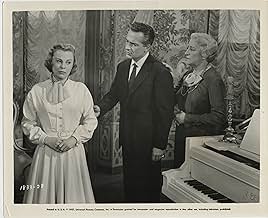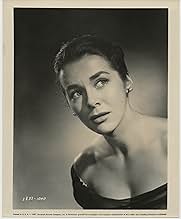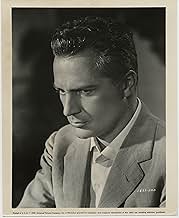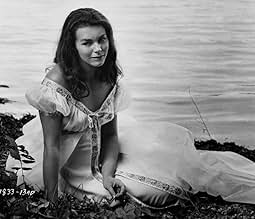Agrega una trama en tu idiomaA young American woman travels to Munich and falls in love with a famous German conductor, only to learn he has a mentally ill wife.A young American woman travels to Munich and falls in love with a famous German conductor, only to learn he has a mentally ill wife.A young American woman travels to Munich and falls in love with a famous German conductor, only to learn he has a mentally ill wife.
- Dirección
- Guionistas
- Elenco
Marianne Koch
- Reni Fischer
- (as Marianne Cook)
Paul Cavanagh
- Dr. Ashley
- (sin créditos)
Opiniones destacadas
A propos of "when tomorrow comes" ,of which "interlude" is the remake: This is not one of Stahl's best works.The movie lacks a center of gravity. Melodrama interferes with social topics(unions,strikes,meetings)and even a deluge,complete with a night in a temple.Besides,the Madeleine character appears too late and is hardly credible.She suffers from mental illness since she lost her child.And the unfortunate heroine tells her so:"you win because you're helpless". Charles Boyer plays the usual Latin lover,and Irene Dunne,the impossible love ,as she did in Fannie Hurst's famous tear-jerker. The ending is ambiguous:in his 1957 remake,the by now usual Sirk remake has a more definitive conclusion. All in all,watchable,because of the cast ,but not a great Stahl.
A propos of "interlude" : Generally Sirk used to work wonders with his remakes of John M Stahl: "magnificent obsession" and 'imitation of life" (in spite of some reservations for the latter) were ,in several respects ,superior to the thirties works ;"interlude" ,on the other hand ,is less interesting than the original,which was not a masterpiece either.Gone are the social concern,the hurricane and the flood -replaced by a little storm- We're left with an old maid (June Allyson whose performance is mediocre and no romantic at all )two suitors (an Italian buck and a handsome American physician ),plus a depressive woman ,which makes some of the final scenes look like an updated Jane Eyre .It's extraordinary that this bland soap opera should precede ,in Sirk 's filmography ,his absolute masterpiece " a time to love and a time to die" which cannot be praised too highly: one finds it hard to believe that the two movies were made by the same director.
French users will notice the presence of Françoise Rosay as the housekeeper.
A propos of "interlude" : Generally Sirk used to work wonders with his remakes of John M Stahl: "magnificent obsession" and 'imitation of life" (in spite of some reservations for the latter) were ,in several respects ,superior to the thirties works ;"interlude" ,on the other hand ,is less interesting than the original,which was not a masterpiece either.Gone are the social concern,the hurricane and the flood -replaced by a little storm- We're left with an old maid (June Allyson whose performance is mediocre and no romantic at all )two suitors (an Italian buck and a handsome American physician ),plus a depressive woman ,which makes some of the final scenes look like an updated Jane Eyre .It's extraordinary that this bland soap opera should precede ,in Sirk 's filmography ,his absolute masterpiece " a time to love and a time to die" which cannot be praised too highly: one finds it hard to believe that the two movies were made by the same director.
French users will notice the presence of Françoise Rosay as the housekeeper.
5fs3
Throughout the 50's, Universal-International was home to most of director Douglas Sirk's striking views of life, love and heartache among the American classes. His work with Rock Hudson, Dorothy Malone, Barbara Stanwyck and others in superior films like Written on The Wind, The Tarnished Angels and There's Always Tomorrow is not matched here.
June Allyson on occasion was able to break free from her standard persona with the fortuitous help of the right co-star, director, script turn or moment in time. Here the noble suffering and Rossano Brazzi do not provide the right formula. The stars try (probably too hard) and the trappings are predictably pretty, but the whole affair is rather unfortunately empty.
June Allyson on occasion was able to break free from her standard persona with the fortuitous help of the right co-star, director, script turn or moment in time. Here the noble suffering and Rossano Brazzi do not provide the right formula. The stars try (probably too hard) and the trappings are predictably pretty, but the whole affair is rather unfortunately empty.
A pretty Girl Takes a Job in overseas and meets the charming psychiatrist Morley Dwyer, who isn't from germany either.
Sehr wears a white dress, almost like a bride. So He has the Impression, she ist looking for a 'husband'. And she meets one: Tonio Fisher, a conductor, is soon quite involved, when she met him - she went to see the ego-oriented fellow in his/their place - an old fashioned but impressive landhouse. There she meets his family too. As it turns out - after a stormy night - he is alredy engaged. But the lady in his side seems not happy. In fact, she s about to fight for her future too. Perhaps it' s difficult to just let go, even of there is some other interests, a woman ist left Into (or should I say: left alone?) But it's perhaps the Background, he needs for being the artist...
Sehr wears a white dress, almost like a bride. So He has the Impression, she ist looking for a 'husband'. And she meets one: Tonio Fisher, a conductor, is soon quite involved, when she met him - she went to see the ego-oriented fellow in his/their place - an old fashioned but impressive landhouse. There she meets his family too. As it turns out - after a stormy night - he is alredy engaged. But the lady in his side seems not happy. In fact, she s about to fight for her future too. Perhaps it' s difficult to just let go, even of there is some other interests, a woman ist left Into (or should I say: left alone?) But it's perhaps the Background, he needs for being the artist...
June varies from her girl next door image, as she plays Helen Banning, a young woman from Philadelphia who travels to Munich not for romance, but for her career and then gets romantically involved with two men, one of them married!
You don't know who to sympathize with more, as all the members of this quadrangle bring out your compassion. There's Helen, whose head is telling her she'd be better off with Dr. Morley Dwyer (Keith Andes), also from Philly and also in Munich form his career, while her heart is pulling her toward Tonio Fischer (Rossano Brazzi), a famous composer whose wife is mentally ill. There's Tonio, who lives with memories of his once happy marriage, yet wants to grab some present happiness for himself. You also feel for Morley, who's fallen for Helen and tries to make her see reason, doesn't want to give up yet may have to admit defeat. And there's Reni Fischer (Marianne Koch), aware of her illness in her lucid moments and suffering because of it, still very much in love with the husband she doesn't want to lose.
This is a no-win situation if ever there was one, as there's no way someone isn't going to get hurt.
I won't give anything away, except to say that, had this movie been made in Pre-Code days, it might have ended differently.
You don't know who to sympathize with more, as all the members of this quadrangle bring out your compassion. There's Helen, whose head is telling her she'd be better off with Dr. Morley Dwyer (Keith Andes), also from Philly and also in Munich form his career, while her heart is pulling her toward Tonio Fischer (Rossano Brazzi), a famous composer whose wife is mentally ill. There's Tonio, who lives with memories of his once happy marriage, yet wants to grab some present happiness for himself. You also feel for Morley, who's fallen for Helen and tries to make her see reason, doesn't want to give up yet may have to admit defeat. And there's Reni Fischer (Marianne Koch), aware of her illness in her lucid moments and suffering because of it, still very much in love with the husband she doesn't want to lose.
This is a no-win situation if ever there was one, as there's no way someone isn't going to get hurt.
I won't give anything away, except to say that, had this movie been made in Pre-Code days, it might have ended differently.
As soon as Douglas Sirk's "Interlude" opened to a theme sung by the MacGuire Sisters, I knew that we were not in typical Sirk territory anymore. Usually, the pairing of director Sirk and producer Ross Hunter brought forth brooding melodrama and biting social commentary. However, somewhere here things go sour. June Allyson fails in her efforts to bring epic emotion to the screen and the entire film lacks any real sense of heart and soul. The romantic leading man, Rossano Brazzi, thankfully brings some continental sophistication and feeling to the proceedings. But nothing really saves this movie from becoming a flaccid piece of 1950s celluloid.
Allyson stars as an American visiting Munich, Germany. She happens to meet a bad-tempered conductor(Brazzi), with an even more poorly-tempered wife. His wife suffers from mental illness which drives Brazzi away from her and into Allyson's arms. Allyson, meanwhile, is also being courted by an American doctor without all of the extra baggage. Allyson is torn between the two men and must make a decision before she heads back home to the U.S.
June Allyson was a poor choice as a leading lady for Sirk. Any number of his other female stars would have been great for the role. But, Allyson? I just don't get it. Besides that, she and Brazzi have absolutely no chemistry. There is not one moment in the film where I wanted to see them end up together. The highlights of this film are the lovely scenes shot against the backdrop of a post-war Europe. Also of note for Sirk fans is the heavy use of reflective surfaces and shadows - common imagery in Sirk movies. In the end, however, Sirk, Hunter and the music of Frank Skinner fail to produce anything of substance. Forgettable and slightly disappointing. The 1968 British version of "Interlude" is far superior and highly recommended.
Allyson stars as an American visiting Munich, Germany. She happens to meet a bad-tempered conductor(Brazzi), with an even more poorly-tempered wife. His wife suffers from mental illness which drives Brazzi away from her and into Allyson's arms. Allyson, meanwhile, is also being courted by an American doctor without all of the extra baggage. Allyson is torn between the two men and must make a decision before she heads back home to the U.S.
June Allyson was a poor choice as a leading lady for Sirk. Any number of his other female stars would have been great for the role. But, Allyson? I just don't get it. Besides that, she and Brazzi have absolutely no chemistry. There is not one moment in the film where I wanted to see them end up together. The highlights of this film are the lovely scenes shot against the backdrop of a post-war Europe. Also of note for Sirk fans is the heavy use of reflective surfaces and shadows - common imagery in Sirk movies. In the end, however, Sirk, Hunter and the music of Frank Skinner fail to produce anything of substance. Forgettable and slightly disappointing. The 1968 British version of "Interlude" is far superior and highly recommended.
¿Sabías que…?
- TriviaA Los Angeles Times newspaper ad from Oct. 1957 shows that Universal Pictures widely distributed this film as "Forbidden Interlude" on a double bill with Man of a Thousand Faces (1957) starring James Cagney.
- ConexionesReferenced in Behind the Mirror: A Profile of Douglas Sirk (1979)
Selecciones populares
Inicia sesión para calificar y agrega a la lista de videos para obtener recomendaciones personalizadas
- How long is Interlude?Con tecnología de Alexa
Detalles
- Tiempo de ejecución1 hora 30 minutos
- Relación de aspecto
- 2.35 : 1
Contribuir a esta página
Sugiere una edición o agrega el contenido que falta

Principales brechas de datos
By what name was Interlude (1957) officially released in India in English?
Responda
